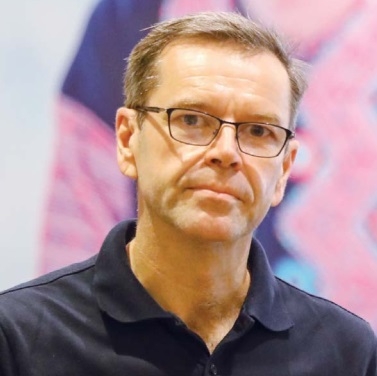GREAT headways to empower local ethnic women
After more than four years of implementing projects to support ethnic minority women in the mountainous provinces of Lao Cai and Son La, what do you see as the biggest barrier in reaching and empowering them?
 |
| Phil Harman, the leader of the GREAT programme on empowering women through economic and tourism development |
Half of the ethnic minority people, especially the H’mong people participating in the project, cannot speak Vietnamese, which makes it difficult for us to implement the project, especially in approaching and working with them.
In addition, we sometimes have to deal with issues related to social norms holding back the development of women in the community such as the fact that many ethnic minority families do not want their children to participate in the tourism industry because of the negative perceptions associated with it.
How have these challenges been addressed?
We have implemented three steps: approach, benefit, and empowerment. Approaching them is probably the easiest step because we only need to involve women in project activities.
The second step is to create benefits, how to help women access resources to participate in production, increase their income, and create jobs for them.
The empowerment step is the most difficult because we have to address issues such as how to increase women’s participation in decision-making or balance workloads between wife and husband in the family, proceeding to improve women’s leadership in activities.
Through the current projects, how do you evaluate the confident and active behaviors of ethnic women?
Ethnic minority women are poor not because they are from ethnic minorities but because they have not had the opportunity to access knowledge to improve their income, develop production and do not have access to input resources such as raw materials and techniques.
We are developing a market map to engage women in the value chain in the production process, focusing on changing existing services for women such as increasing training activities to improve their skills, and at the same time providing support to help them access credit in a better way.
In addition, we work with private firms to address the underlying causes of poverty rather than just the superficial symptoms.
In addition to the tourism sector, project activities also focus on agricultural occupations, including traditional industries that attract more women to participate such as tea cultivation, rice and medicinal plant cultivation, and bamboo shoots. There are also new industries where women have a large participation, such as the planting of ramie.
We are already seeing the sector starting to grow but to take it to the next level, we need increased investment in the sector, mainly to improve processes to grow ramie seedlings but also other support including logistics and training services.
At the same time, we also focus on solving issues such as policies, increasing access to finance, applying digital technology in the ethnic minority community, and improving the startup mindset.
The programme isn’t only designed to enhance people’s capacity, it also trains and integrates gender topics into activities. The gender topics in the project have an impact on changing people’s mindsets in their daily life. For example, people, especially women, were very shy in the meetings or when they contributed ideas about their household’s economic development.
Now, they have become more confident and are more willing to share their ideas or suggestions at the meetings.
| The Australian government-funded Gender Responsive Equitable Agriculture and Tourism (GREAT) project supports women to profitably engage in agriculture and tourism in Lao Cai and Son La. Since 2017, more than 8,000 ethnic minority women have enjoyed increased incomes and 834 new jobs have been created for women in the two provinces. |
What the stars mean:
★ Poor ★ ★ Promising ★★★ Good ★★★★ Very good ★★★★★ Exceptional
Themes: Empowering Women
- Female influence still to be attained
- Shaping Vietnam's corporate future: female board members show business excellence
- Nestlé Vietnam contributes to elevating the role of women across the supply chain
- Empowering female leaders in tech: insights and aspirations shared at KPMG Tech Innovator 2023
- Brighter Path programme hosts empowerment meeting for ethnic minority girls
Related Contents
Latest News
More News
- Tet event in Japan celebrates success of 14th National Party Congress (January 25, 2026 | 10:04)
- 14th National Party Congress wraps up with success (January 25, 2026 | 09:49)
- Congratulations from VFF Central Committee's int’l partners to 14th National Party Congress (January 25, 2026 | 09:46)
- List of newly-elected members of 14th Political Bureau announced (January 23, 2026 | 16:27)
- 14th Party Central Committee unanimously elects To Lam as General Secretary (January 23, 2026 | 16:22)
- List of members of 14th Party Central Committee announced (January 23, 2026 | 09:12)
- Highlights of fourth working day of 14th National Party Congress (January 23, 2026 | 09:06)
- Press provides timely, accurate coverage of 14th National Party Congress (January 22, 2026 | 09:49)
- Press release on second working day of 14th National Party Congress (January 22, 2026 | 09:19)
- Minister sets out key directions to promote intrinsic strength of Vietnamese culture (January 22, 2026 | 09:16)

 Tag:
Tag:


















 Mobile Version
Mobile Version